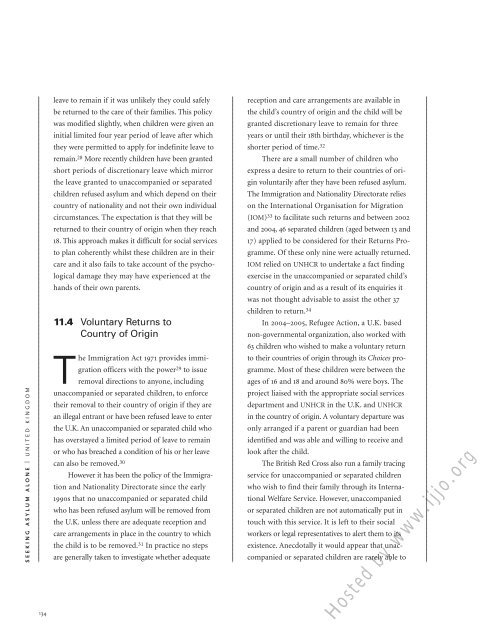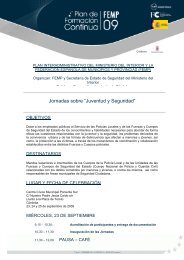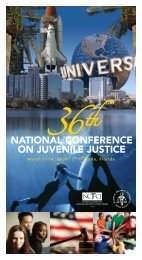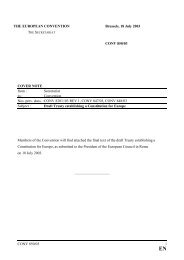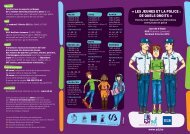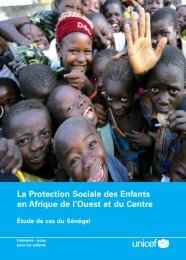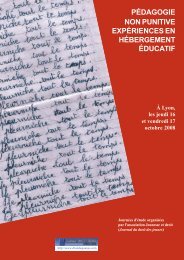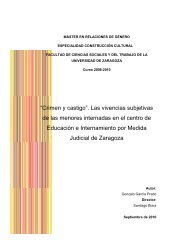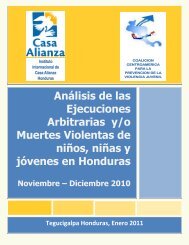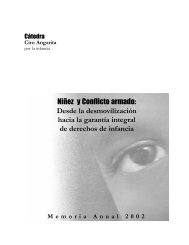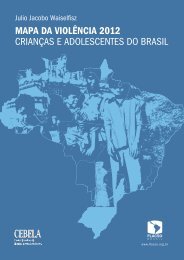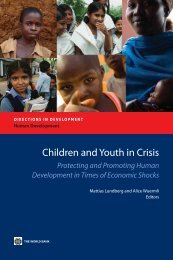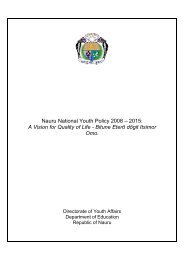Hosted by www.ijjo.org
Hosted by www.ijjo.org
Hosted by www.ijjo.org
Create successful ePaper yourself
Turn your PDF publications into a flip-book with our unique Google optimized e-Paper software.
leave to remain if it was unlikely they could safely<br />
reception and care arrangements are available in<br />
be returned to the care of their families. This policy<br />
the child’s country of origin and the child will be<br />
was modified slightly, when children were given an<br />
granted discretionary leave to remain for three<br />
initial limited four year period of leave after which<br />
years or until their 18th birthday, whichever is the<br />
they were permitted to apply for indefinite leave to<br />
shorter period of time. 32<br />
remain. 28 More recently children have been granted<br />
There are a small number of children who<br />
short periods of discretionary leave which mirror<br />
express a desire to return to their countries of ori-<br />
the leave granted to unaccompanied or separated<br />
gin voluntarily after they have been refused asylum.<br />
children refused asylum and which depend on their<br />
The Immigration and Nationality Directorate relies<br />
country of nationality and not their own individual<br />
on the International Organisation for Migration<br />
circumstances. The expectation is that they will be<br />
(IOM) 33 to facilitate such returns and between 2002<br />
returned to their country of origin when they reach<br />
and 2004, 46 separated children (aged between 13 and<br />
18. This approach makes it difficult for social services<br />
17) applied to be considered for their Returns Pro-<br />
to plan coherently whilst these children are in their<br />
gramme. Of these only nine were actually returned.<br />
care and it also fails to take account of the psycho-<br />
IOM relied on UNHCR to undertake a fact finding<br />
logical damage they may have experienced at the<br />
exercise in the unaccompanied or separated child’s<br />
hands of their own parents.<br />
country of origin and as a result of its enquiries it<br />
was not thought advisable to assist the other 37<br />
11.4 Voluntary Returns to<br />
Country of Origin<br />
children to return. 34<br />
In 2004–2005, Refugee Action, a U.K. based<br />
non-governmental <strong>org</strong>anization, also worked with<br />
63 children who wished to make a voluntary return<br />
The Immigration Act 1971 provides immigration<br />
officers with the power 29 to issue<br />
removal directions to anyone, including<br />
to their countries of origin through its Choices programme.<br />
Most of these children were between the<br />
ages of 16 and 18 and around 80% were boys. The<br />
SEEKING ASYLUM ALONE | UNITED KINGDOM<br />
134<br />
unaccompanied or separated children, to enforce<br />
their removal to their country of origin if they are<br />
an illegal entrant or have been refused leave to enter<br />
the U.K. An unaccompanied or separated child who<br />
has overstayed a limited period of leave to remain<br />
or who has breached a condition of his or her leave<br />
can also be removed. 30<br />
However it has been the policy of the Immigration<br />
and Nationality Directorate since the early<br />
1990s that no unaccompanied or separated child<br />
who has been refused asylum will be removed from<br />
the U.K. unless there are adequate reception and<br />
care arrangements in place in the country to which<br />
the child is to be removed. 31 In practice no steps<br />
are generally taken to investigate whether adequate<br />
project liaised with the appropriate social services<br />
department and UNHCR in the U.K. and UNHCR<br />
in the country of origin. A voluntary departure was<br />
only arranged if a parent or guardian had been<br />
identified and was able and willing to receive and<br />
look after the child.<br />
The British Red Cross also run a family tracing<br />
service for unaccompanied or separated children<br />
who wish to find their family through its International<br />
Welfare Service. However, unaccompanied<br />
or separated children are not automatically put in<br />
touch with this service. It is left to their social<br />
workers or legal representatives to alert them to its<br />
existence. Anecdotally it would appear that unaccompanied<br />
or separated children are rarely able to<br />
<strong>Hosted</strong> <strong>by</strong> <strong>www</strong>.<strong>ijjo</strong>.<strong>org</strong>


